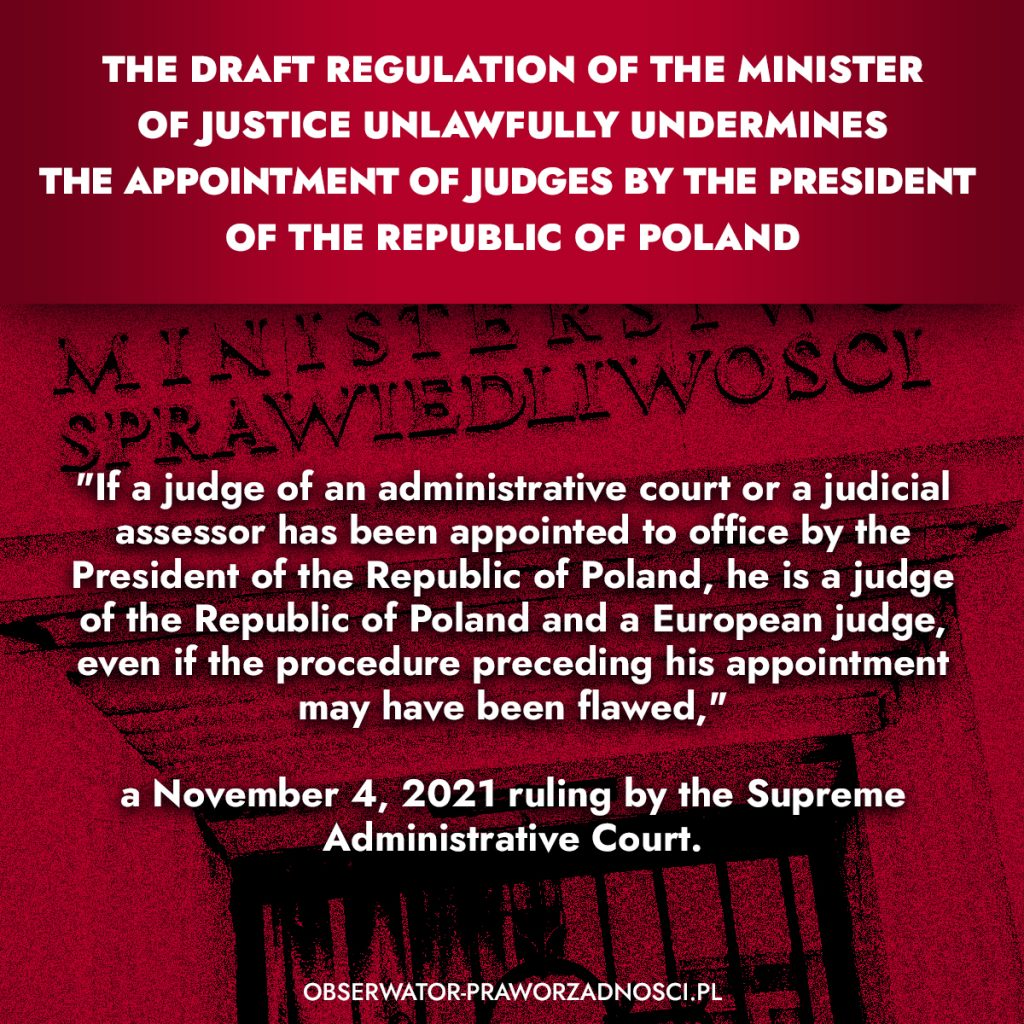The reason for the controversy and confusion regarding the issue of the legality of the functioning of the National Judiciary Council is the unfounded claims of opposition politicians and some representatives of the legal doctrine, according to which, after the reforms carried out in 2017 by the then ruling party, this body allegedly lost the attribute of independence.
The new rules for the selection of part of the NCJ, according to politicians of the then opposition and today’s ruling majority, were carried out in a manner inconsistent with the Constitution. As a result, they claim, the judges appointed by the President with the participation of the NJC, which in their view was inappropriately staffed, did not acquire the status of a judge and the judges promoted in the process must return to their previous positions and take part in new, “legal” competitions. What’s more, some proponenets of the view go even further, calling for the declaration of all verdicts issued with the participation of judges appointed since 2018 as as null and void.
In this context, there have been proposals, for several years, to introduce a so-called “test of independence”, which would evaluate more than 2,500 judges appointed to their positions after the change in the rules of the NCJ. This test would allow for “verification” that a given judge meets the requirements of impartiality and independence. The demand for the establishment of a test of independence appeared, among other things, in a recently publicized draft regulation of the Minister of Justice.
Mechanisms that allow for the status of some judges to be questioned by other judges (appointed in an earlier period) based on underdefined criteria constitute a flagrant violation of the guarantees of the independence of judeges and courts. It should be stressed that under Article 178(1) of the Constitution of the Republic of Poland, in the exercise of their office judges are independent and subject only to the Constitution and statutes. In turn, Article 180(1) of the Polish Constitution stipulates that judges are irremovable, which is a fundamental guarantee of judicial independence. This guarantee is therefore extended to judges, i.e., pursuant to Article 179 of the Constitution of the Republic of Poland, persons appointed by the President to the office of judge at the request of the National Judiciary Council. As emphasized in jurisprudence, the appointment of a judge is an act of constitutional law involving the formation of the personnel of the judiciary authority, which constitutes a discretionary decision of the President, falling within the scope of his personal prerogative (decision of the Supreme Administrative Court of December 7, 2017, ref. I OSK 857/17).
The appointment of a judge is a prerogative of the President, and a possible hypothetical defect in the staffing of the National Judiciary Council is not a sufficient basis for challenging the status of judges appointed by the President. This is confirmed by the jurisprudence of the Supreme Administrative Court – a body whose proper legitimacy has never been questioned and whose judges are not those directly involved in the dispute over the status of judges of common courts and the Supreme Court. All of the cited rulings have been issued after the legal changes to the way in which a part of the National Judicial Council was staffed:
“In view of the previous acts of appointment of judges and assessors of administrative courts from among candidates presented by the National Judiciary Council formed under the new rules, who exercise the administration of justice, and issue judgments on behalf of the Republic of Poland, it is impossible to accept, that the alleged defectiveness of the Council, however it may impact the assessment of the correctness of judicial appointments, is a sufficient premise for declaring the judgments issued by these judges to be null and void or defective. Even if one were to consider that the body submitting the application for appointment in the form of the current National Judiciary Council did not meet the constitutional requirements, it should be recognized that the application was submitted, it was subject to judicial review, and, most importantly, the President of the Republic of Poland, within the authority granted to him, made a substantive assessment of it, appointing the person in question to the position of judge or assessor of an administrative court” – Ruling of the Supreme Administrative Court of September 15, 2022, ref. III OZ 493/22.
„A judge of an administrative court or a judicial assessor in a provincial administrative court, appointed to hold office by the President of the Republic of Poland, is a judge of the Republic of Poland, and a European judge within the meaning of Articles 2 and 19(1) and 6(1)(3) of the Treaty on European Union (Journal of Laws of 2004, No. 90, item 864/30, as amended) in conjunction with Article 47 of the Charter of Fundamental Rights (Official Journal of the EU C 303 of December 14, 2007, p. 1), as well as Article 6(1) of the Convention for the Protection of Human Rights and Fundamental Freedoms drawn up in Rome on November 4, 1950 (Journal of Laws of 1993, No. 61, item 284, as amended), also when the procedure preceding its appointment may have been flawed. In terms of the EU and Convention standards of the right to a court trial, it can be considered that if a judge or judicial assessor who meets the constitutional standards of sovereignty, independence and impartiality sits on the bench of a provincial administrative court, even if he was appointed by the President at the request of the National Judicial Council in the composition formed by the law of December 8, 2017, then such a court should be considered a European court within the meaning of Articles 2 and 19(1) of the Treaty on European Union, Article 6(1)-(3) of the TEU in conjunction with Article 47 of the Charter of Fundamental Rights and Article 6(1) of the Convention for the Protection of Human Rights and Fundamental Freedoms” – Rulling of the Supreme Administrative Court of November 16, 2021, ref. III FSK 4255/21.
„If an administrative court judge or a judicial assessor has been appointed to an office by the President of the Republic of Poland, he or she is a judge of the Republic of Poland and a European judge, even if the procedure preceding his or her appointment may have been flawed” – Ruling of the Supreme Administrative Court, November 4, 2021, III FSK 3626/21.
„In the nomination procedure for judges, the President does not have a mere approving role, but can oppose any nomination in a situation where he considers that the nomination of a person to the position of judge would contradict the constitutional values he was appointed to protect. The power to appoint judges is a personal power of the President, and the Constitution knows of no subjective right of access to judicial service. This prejudges the inability of the administrative courts to exercise control over acts related to such a procedure. In a situation where the President has found no grounds for refusing to appoint a judge, the Supreme Administrative Court, in proceedings to exclude a judge, cannot assess the correctness of the appointment of that judge. The institution of the exclusion of a judge does not serve to control the actions of the President taken within the framework of his constitutional powers set forth in Article 179 and Article 144(2) and (3)(17) of the Constitution” – Ruling of the Supreme Administrative Court of January 27, 2020, ref. I OSK 1917/18.
It follows from the cited jurisprudence, as well as from the content of the Constitution of the Republic of Poland, which is the highest and directly applicable law of the Republic of Poland, that whether a person is a judge is determined solely by the act of appointment by the President. No body has the authority to review presidential competence in the indicated scope. Any attempt to undermine the status of judges appointed by the President constitutes a blatant attack on judicial independence. It would constitute unlawful pressure on a significant portion of Polish judges, while undermining the foundations of the principle of a democratic state ruled by law.




